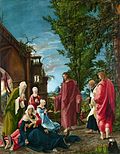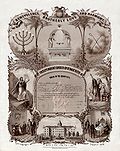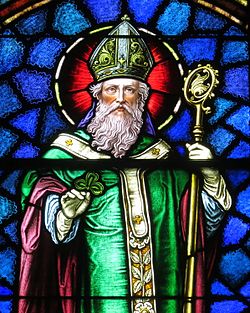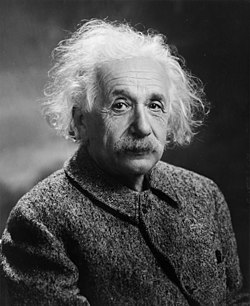Portal:Religion
The Religion Portal
Religion is a range of social-cultural systems, including designated behaviors and practices, morals, beliefs, worldviews, texts, sanctified places, prophecies, ethics, or organizations, that generally relate humanity to supernatural, transcendental, and spiritual elements—although there is no scholarly consensus over what precisely constitutes a religion. It is an essentially contested concept. Different religions may or may not contain various elements ranging from the divine, sacredness, faith, and a supernatural being or beings. (Full article...)
 Vital article
Vital article
The meaning of spirituality has developed and expanded over time, and various meanings can be found alongside each other. Traditionally, spirituality referred to a religious process of re-formation which "aims to recover the original shape of man", oriented at "the image of God" as exemplified by the founders and sacred texts of the religions of the world. The term was used within early Christianity to refer to a life oriented toward the Holy Spirit and broadened during the Late Middle Ages to include mental aspects of life. (Full article...)
 Did you know (auto-generated)
Did you know (auto-generated)
- ... that the Grave with the Hands commemorates a married couple, divided by society and religion, with hands clasped over a cemetery wall after death?
- ... that Gherardo Gambelli, the incoming archbishop of Florence, served as a prison chaplain in Chad for over a decade?
- ... that Musa va 'Uj depicts figures from all three Abrahamic religions?
- ... that a religious community is a group of people who practice the same religion, but do not have to live together?
- ... that across his thirty-six collections, fashion designer Alexander McQueen contemplated religion, told fairy tales, and criticized the fashion industry?
- ... that fictional religions, often described in speculative fiction, have in some cases inspired real religious movements?

Several attempts at a military alliance between the Frankish Crusaders and the Mongol Empire against the Islamic caliphates, their common enemy, were made by various leaders among them during the 13th century. Such an alliance might have seemed an obvious choice: the Mongols were already sympathetic to Christianity, given the presence of many influential Nestorian Christians in the Mongol court. The Franks—Western Europeans, and those in the Levantine Crusader states—were open to the idea of support from the East, in part owing to the long-running legend of the mythical Prester John, an Eastern king in an Eastern kingdom who many believed would one day come to the assistance of the Crusaders in the Holy Land. The Franks and Mongols also shared a common enemy in the Muslims. However, despite many messages, gifts, and emissaries over the course of several decades, the often-proposed alliance never came to fruition. (Full article...)


































































